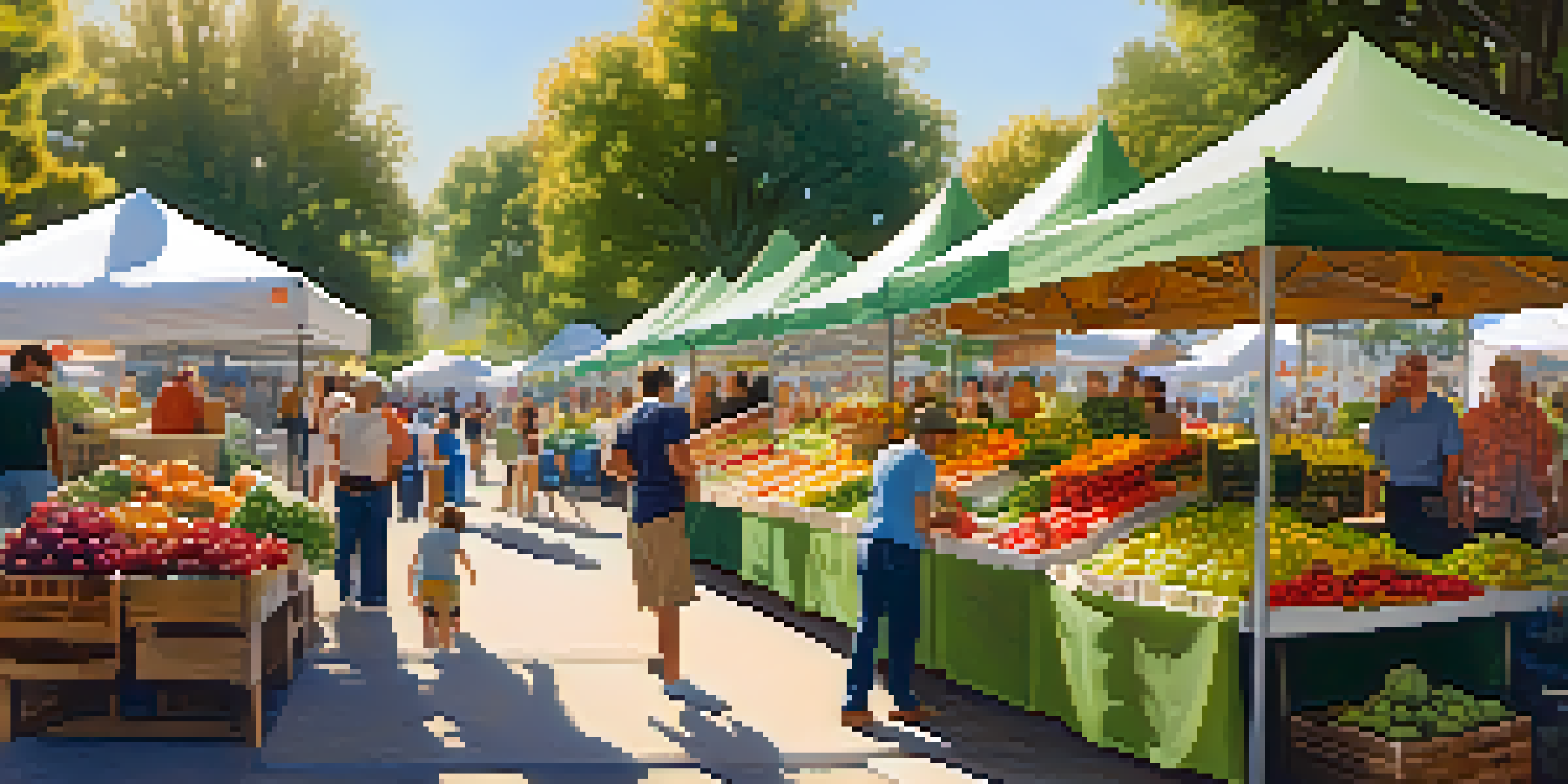The Role of Sustainability in Pasadena's Food Scene Today

Understanding Sustainability in the Food Industry
Sustainability in the food industry refers to practices that prioritize environmental health, social equity, and economic viability. It encompasses everything from how food is grown and harvested to how it’s distributed and consumed. In simple terms, it's about making choices that protect our planet for future generations.
Sustainability is no longer about doing less harm. It's about doing more good.
This concept is increasingly important as consumers become more aware of their impact on the environment. In Pasadena, this awareness has sparked a movement among local restaurants and farmers to embrace sustainable practices. By choosing organic ingredients, reducing waste, and supporting local economies, they’re making strides towards a more sustainable food system.
For example, the farm-to-table approach has gained popularity here, illustrating the connection between sustainability and local food sources. By sourcing ingredients from nearby farms, restaurants not only reduce their carbon footprint but also support local farmers, enriching the community.
The Rise of Farm-to-Table Restaurants in Pasadena
Farm-to-table restaurants have become a hallmark of Pasadena's food scene, showcasing the best of local produce. These establishments prioritize fresh, seasonal ingredients, often sourced directly from nearby farms. This not only enhances the flavors of the dishes but also aligns with sustainable practices.

One notable example is a local eatery that changes its menu regularly based on what’s in season. This approach not only supports local agriculture but also encourages diners to explore new flavors and dishes. It's a win-win for both the environment and the palate!
Sustainability Drives Local Dining
Pasadena's restaurants are increasingly adopting sustainable practices, such as sourcing local ingredients, to enhance flavor and support the community.
Moreover, these restaurants foster a stronger connection between chefs and local farmers, creating a community that values sustainability. Diners are increasingly drawn to these places, not just for the food but for the story behind it, making sustainability a key ingredient in their dining experience.
Local Farmers' Markets: A Hub for Sustainability
Pasadena's farmers' markets serve as vibrant hubs for sustainability, offering fresh produce while supporting local agriculture. These markets not only provide access to organic and seasonal foods but also create a space for community engagement. Shoppers can meet the farmers who grow their food, fostering trust and transparency.
The food industry is one of the most powerful ways to create change in the world, and it all starts with the choices we make.
Additionally, these markets help reduce carbon emissions associated with food transportation. When consumers buy directly from farmers, they are cutting out the middleman, ensuring that more of their money goes back into the local economy. This practice promotes a circular economy that benefits everyone involved.
Moreover, farmers' markets often feature educational programs and workshops, emphasizing the importance of sustainable practices. By encouraging consumers to choose local over imported, these markets play a pivotal role in reshaping Pasadena's food landscape.
Sustainable Practices in Local Restaurants
Many local restaurants in Pasadena are adopting sustainable practices that range from composting to energy-efficient cooking methods. These initiatives not only reduce waste but also lower operational costs, proving that sustainability can be economically beneficial. For instance, some restaurants have implemented systems to recycle cooking oil, turning it into biodiesel.
Another example is the increasing use of biodegradable packaging for takeout orders. This shift helps minimize plastic waste, which is a significant contributor to environmental degradation. By making these small changes, restaurants are creating a larger impact on sustainability.
Farmers' Markets Foster Community
Local farmers' markets in Pasadena not only provide fresh produce but also promote sustainability by connecting consumers directly with farmers.
Furthermore, engaging in sustainable practices can enhance a restaurant's reputation. Diners today are more likely to support businesses that demonstrate a commitment to the environment, making sustainability a key factor in customer loyalty.
The Role of Community in Promoting Sustainability
Community involvement is vital to promoting sustainability in Pasadena's food scene. Local organizations and non-profits often collaborate with restaurants and farmers to raise awareness about sustainable food practices. Events like community dinners and cooking classes encourage residents to embrace local ingredients and cooking methods.
Moreover, social media platforms have become powerful tools for spreading the message of sustainability. Pasadena residents are sharing their experiences at local eateries and farmers' markets, inspiring others to join the movement. This collective effort creates a ripple effect, amplifying the reach of sustainable practices.
As more people engage with their food sources and support local businesses, the entire community benefits. This interconnectedness reinforces the idea that sustainability is not just a trend, but a lifestyle choice that can lead to lasting change.
Challenges Facing Sustainable Food Practices
Despite the progress made, sustainable food practices in Pasadena face several challenges. One of the most significant hurdles is the increased cost associated with organic and locally sourced ingredients. While many residents are eager to support sustainability, not everyone can afford the premium prices often associated with these foods.
Additionally, there can be a lack of awareness or understanding of what sustainability truly means. Some consumers may feel overwhelmed by the choices available and unsure of how to make the best decisions for their health and the environment. Education and outreach are crucial to bridging this gap.
Community Efforts Promote Awareness
Community involvement and social media play vital roles in spreading awareness about sustainable food practices, encouraging greater participation among residents.
Lastly, competition from larger chains that may not prioritize sustainability can overshadow local businesses. Promoting a strong sense of community support for local, sustainable options is essential to ensure these practices thrive in Pasadena.
The Future of Sustainability in Pasadena's Food Scene
Looking ahead, the future of sustainability in Pasadena's food scene appears promising. With an increasing number of restaurants and markets committing to sustainable practices, the community is poised for a transformation. The ongoing education and advocacy efforts will continue to raise awareness and encourage more people to participate in these initiatives.
Moreover, technological advancements are making it easier for restaurants to implement sustainable practices. Innovations in food preservation, waste management, and sourcing can help streamline operations while minimizing their environmental impact. As these technologies evolve, they will play a crucial role in shaping the future of sustainable dining.

Ultimately, the movement towards sustainability is not just a trend; it's becoming a core value of Pasadena's culinary identity. As more residents and businesses embrace this approach, the city will likely become a model for sustainable food practices, inspiring others to follow suit.